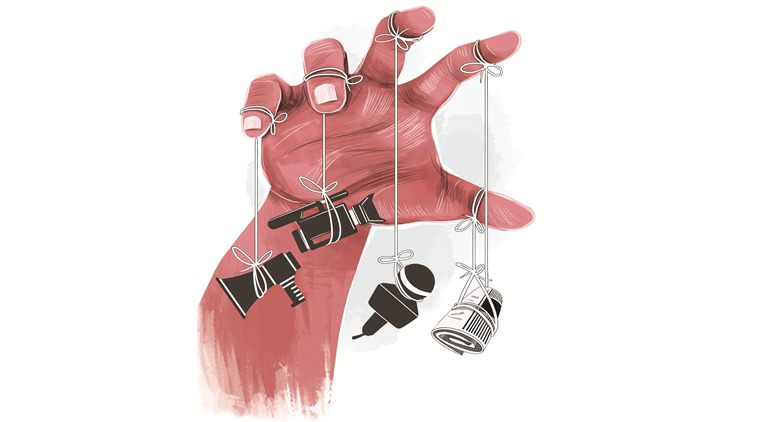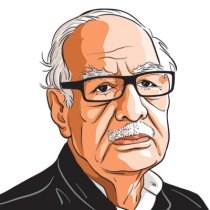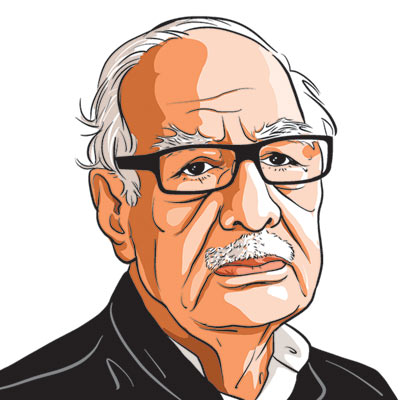How freedom is lost
Can Emergency be reimposed, I have often wondered

One current development is ominous. Soft Hindutva is overtaking the print and electronic media. (Illustration: Suvajit Dey)
When I recall the imposition of the Emergency what comes to mind is the atmosphere of fear created by Sanjay Gandhi, an extra-constitutional authority who drew strength from his mother, then Prime Minister Indira Gandhi.
Here was the nation that ousted the mighty British after long years of their rule, yet it caved in without any visible protest. Fundamental rights were suspended, the press was gagged, and nearly 1,00,000 people were detained without trial, but still, in the vast land of India, there were hardly any street protests or resistance to the dictatorial rule.
If I were to explain this failing to the Indians of today or tomorrow, I would say that we faltered as a nation. Indira Gandhi switched off the lights of democracy to make us grope in the darkness of a Police Raj. We lived in that state till the Emergency was lifted 21 months later. As her attorney general, Niren De, said during the defence of the Emergency in a court of law, the government could take away somebody’s life and would still not be answerable because of the powers that emergency rule conferred on the authorities.
True, there was no proverbial midnight knock. But there was a telephone call from my office, The Indian Express, informing me that the police were not allowing the distribution of that morning’s edition. Their explanation was that the Emergency had been declared. I wondered how they could declare another Emergency when there was already one continuing from the days of the Bangladesh war.
I don’t want to get lost in the details, but what the Emergency meant was that British-type colonial rule had returned through the back door. And, as before, my personal rights and freedom of expression had been forcibly taken away. How do I explain to the youth of today that India nearly lost its freedom? And of all people, it was Indira Gandhi who was responsible for this calamity, the daughter of our national icon, Jawaharlal Nehru, who had put the country on the path of liberty and democracy after Independence. He had told the All-India Newspaper Editors’ Conference on December 3, 1950, “I would have a completely free press with all the dangers involved in the wrong use of that freedom than a suppressed or a regulated press”.
Indira Gandhi’s action was shocking but more appalling was the collapse of journalists, who otherwise would pontificate on courage and confrontation. The then Jana Sangh leader L K Advani made an apt remark: “You were asked to bend but you began to crawl.”
Can the Emergency be reimposed, I have often wondered. The Constitution makes it difficult because of the amendment that the Janata government effected. A prime minister has to get the approval of two-thirds of the members of both Houses of Parliament before such a step can be taken.
But seeing how conformist the press is today, I don’t think it would be necessary for the government to take any extra-constitutional measures. Newspapers and television channels have themselves become so pro-establishment that the government doesn’t have to do anything to make them fall in line. I am reminded of Indira Gandhi’s days. Her supporters unthinkingly created an atmosphere of sycophancy. Her political advisor and informer, Yashpal Kapoor, had coined the slogan, “Desh ki neta Indira Gandhi”. This was improved on by the then Congress president, D K Baruah, who said “Indira is India,” little realising that it would cause a great deal of embarrassment because it was much like the oath administered to Nazi youth: “Adolf Hitler is Germany and Germany is Adolf Hitler.”
However, one current development is ominous. Soft Hindutva is overtaking the print and electronic media. They go out of their way to black out the minority point of view. One glaring example is a recent statement by a Muslim woman from Mumbai. She said that, as a Muslim, she could not get a house in any posh locality. In contrast, had this statement been made by a Hindu, newspapers and television channels would have reported it and commented for days to express their criticism.
The Muslim woman’s statement was perfunctorily noted, but not debated or discussed. This does not behove a society that has enshrined secularism in the preamble to its Constitution. Still worse is that the excesses committed against the minorities are scantily reported and hardly discussed. Only 70 years ago, when we won independence to establish a secular and democratic state, we took pride in the fact that, despite the demand for Pakistan, the preponderant majority still believed in the idea of India that Mahatma Gandhi, Nehru, Sardar Patel and Maulana Azad subscribed to.
India is a democratic, secular and socialist state. Today, when one-third of the population goes to bed without an evening meal, I wonder what has happened to this idea of India. True, we have been able to ensure fairly free elections, but we have not pulled out millions of people still stuck in poverty. The news from China is that it has rescued 20 million from poverty at one go. We are far from matching that impressive achievement. Of course, the difference is that, in contrast with our democratic, open society, China is a totalitarian state. Granted that the outside world is not allowed to see the real face of China because travel is restricted and Big Brother is always watching you. Yet the statistics indicate that it has made far more economic progress than India.
The fact is that we have chosen a democratic way of functioning. Progress is bound to be slow, but what worries me is the increasing parochialism that is overtaking society. This may negate the idea of India if, after 40 years, we realise that communal forces can undo whatever little we have achieved. The message would have gone home. But I am sure the next 40 years will see us realising the dream of our freedom fighters to establish a secular, democratic and socialist republic.
This article first appeared in The Indian Express on June 25, 2015. The writer, who died on August 23, was an Editor at The Indian Express
For all the latest Opinion News, download Indian Express App
More From Kuldip Nayar
- Who belongs to the House, who doesn’tThe apex court’s ruling against a state domicile requirement for a Rajya Sabha seat must be challenged..
- When you crawl, unaskedIt would not be necessary for an autocratic government to take any extra-constitutional measures today, so pro-establishment has the media become...
- Secularism has weak rootsThe nation is looking increasingly parochial. Was pluralism only a Nehruvian concept?..








































No hay comentarios:
Publicar un comentario